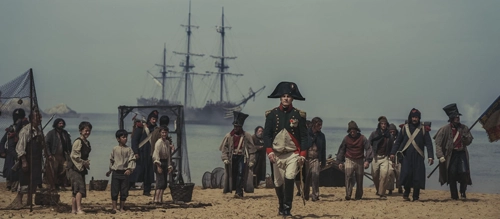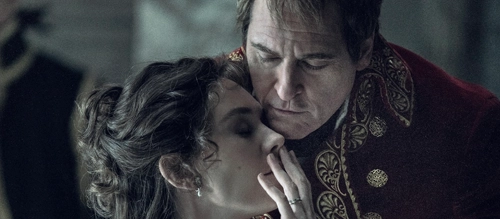Napoleon (2023) Review

Napoleon (2023)
Director: Ridley Scott
Screenwriter: David Scarpa
Starring: Joaquin Phoenix, Vanessa Kirby, Tahar Rahim, Rupert Everett, Paul Rhys
Almost a quarter of a century after his swords and sandals epic Gladiator became a critically acclaimed cultural phenomenon and Oscars Best Picture winner, Ridley Scott re-teams with one of its stars – one of this generation’s leading actors and a multi-time Academy Award nominee, Joaquin Phoenix – to revisit another of history’s most written about leaders, Napoleon Bonaparte of France. With more historically accurate locations and just as many period-appropriate costumes as in his turn of the century fable, this life and times of France’s great-then-disgraced general should be a lot more affecting than it actually is. This bullet point journey through Bonaparte’s rise and fall from power doesn’t make powerful comment on the corruption of man, nor does it evaluate the emperor’s influence on war or peace, on Europe or France or the United Kingdom or Russia. In fact, it doesn’t say much at all…
It would be difficult to chronicle Napoleon’s story and fail to capture the imagination in one way or another. This is one of history’s most important figures, an emblem of power and greed. His various roles in post-revolution France took him across continents, saw him as the figurehead of coups, and brought about the deaths of more than one million people. His was a life filled with so many historically significant events, moments, and decisions, that anyone with so much as an Encyclopaedia Britannica could recount his story with at least some drama, shock and awe. The issue with this $200million film is that the script does little more than precisely that, recounting the significant moments of his leadership as if listing them out of a book, with a cheap and at times barely legible love angle tacked on to evoke empathy and provide commentary on the events that come fast and often with little context.
Joaquin Phoenix tries his best. He dominates every scene, embodying a character he clearly sees as more of a creature than a man. Under his spell, Napoleon Bonaparte is worthy of attention, a character whom we are desperate to investigate, to interrogate. But the film doesn’t allow for that. As we depart the beheading of Marie Antoinette in revolution-era France to first meet our subject, Phoenix is not unlike a lion with his jaw clenched, his eyes glazed, his uniform as extravagant and symbolic as a mane. There is so much promise held within this introduction – a potentially world-shifting performance, some spectacular wardrobe work, effective framing and blocking – and instead it sadly becomes emblematic of a film that leaves so much of its potential unfulfilled.
The bullet point journey through Napoleon’s conquests, political manoeuvres, and exiles, requires an emotional core for any potential audience to attach to, and it finds that in the would-be emperor’s marriage to his beloved Josephine. Vanessa Kirby embodies the infamous leader’s muse as if a witch who has cast a spell, and the Oscar-nominated performer’s turn is at times just as beguiling as Phoenix’s. Together, they never hit the highs of some of their other on-screen relationships (Phoenix in Her, Kirby in Pieces of a Woman), nor is their relationship as moving as that presented by Mel Gibson and Catherine McCormack in Braveheart, or as lustful as that presented by Omar Sharif and Julie Christie in Doctor Zhivago. There isn’t even a sense of dangerous plotting as underlined by the incestuous relationship hinted at between Phoenix and Connie Nielsen in Gladiator, which at least provoked a reaction. In Napoleon, Phoenix and Kirby are believably brought together, but they are far from enchanted by one another, and as time passes and events occur, you expect that to become part of the commentary on Napoleon’s lack of humanity, but it doesn’t. Napoleon instead frames this relationship as the beating heart of its subject, as the primary motivating factor, the biggest achievement, the biggest regret. And the film only takes brief moments to dissect this, or even present a valid argument as to how the relationship motivated the man to achieve otherworldly horrors. Theirs is a story that runs parallel to the story of Napoleon’s “achievements”, evolving from time to time but largely suffering from the same “this happens and then this happens and then this happens” that plagues the rest of the tale.

Beyond the limitations of David Scarpa’s screenplay, which was no doubt limited in its potential by the vast period of time it sought to cover (a period of more than 25 years), and the effects this has on Claire Simpson’s editing and pacing of the film, Napoleon does achieve a lot cinematically. First and foremost, the costume work is spectacular. David Crossman and Janty Yates’ work in costuming is nothing short of stellar, and a glimpse at the level of quality many expected a modern Ridley Scott historical epic to achieve. Everyone looks unique and period-appropriate, but the smaller details on the limited selection of main characters are worthy of the biggest screen possible and plenty of critical acclaim. Similarly, the production design by Arthur Max is a significant factor in bringing cinematic qualities to scenes that are otherwise inconsequential or at least far from unmissable. The party and governmental scenes are where the latter shines the brightest, some sequences decked out and presented as if the period’s great paintings.
Ridley Scott must be commended for his role in bringing this to life, too. Some shots are of the highest cinematic calibre, a master clearly touching on the greatness that has been foundational to his visually impressive career to date. His party scenes are filled with life, there are unique physical qualities to many of the major historical figures at play in the story, and he seems intent on ensuring that not a single battle is presented in as bland a fashion as many other director’s have long since settled. His work with cinematographer Dariusz Wolski in the capturing of cold, of fog, of early morning winter sunrises, imbues the piece with a sense of reality and ensures that nobody can be bored by the achievements held within each frame. Some sequences, such as the one in which Napoleon takes Moscow, are worthy even of a highlight reel that includes The Duellists, Alien, Blade Runner, Thelma & Louise and Gladiator.
As has often been the case in more recent Scott movies, there are also shots, scenes and sometimes even entire sequences that seem absent of his once unique and form-topping touch. Early on, it is easy to be removed from the reality of the time period courtesy of poor CGI, such as that showing Joaquin Phoenix riding a horse on a beach or large crowds resembling AI renditions more than actual people. The picture is also so awash with greys that it seems more like a mid-2000s early digital filmmaking release than even Scott’s own from that era. Some night time shots are utterly spectacular, and seem to be of the same school as those celebrated in Jordan Peele’s Nope, but there are vast periods in which everything looks washed out, and it is almost certain that minutes of this film will be barely legible (too dark) to anyone who eventually watches it at home.
Ridley Scott has spoken a lot in the press tour for Napoleon about how his movies do not need to be historically accurate. When a film seeks to explore something thematically, personally, or ideologically, then Scott is most certainly correct. Film is art, and art seeks truth rather than fact. Gladiator worked because of this perspective, because of how it abandoned fact in search of the truth held within the myth. But Napoleon doesn’t do that. It presents moment after moment from the history books, often inaccurately out of negligence as opposed to deeper purpose. There is no doubt that a lot of care and artistry can be seen on screen in Napoleon, but that negligence will be the story of this film: a movie that could have been great, that could have meant something, that could have simply been accurate, and ended up being none of those things. Like Napoleon himself, Napoleon thinks itself as greater than it is. It isn’t insulting like Ridley Scott’s idea of Napoleon firing canons into the Great Pyramid of Giza was to historians the world over, but it does offer only glimmers at its full might. Some individual pieces are greater than the whole in this instance, and what a shame that is. This should have been special.
Score: 15/24
Recommended for you: Ridley Scott Films Ranked

